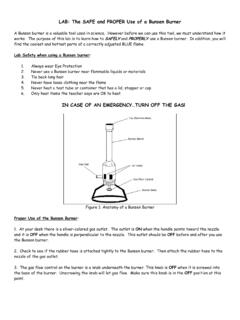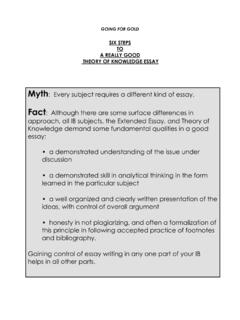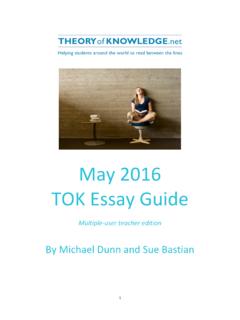Transcription of Prescribed Title Essay Advice from a new frazzled examiner
1 Prescribed Title Essay Advice from a new frazzled examiner 1. make sure you understand exactly what the prompt is asking There is a Prescribed Title from last year that asks "Are reason and emotion equally necessary in justifying moral decisions?" Many students are comparing reason and emotion in the context of making moral decisions. While making moral decisions may relate to justifying them, it's not the same thing. This affects the Essay 's score. 2. make sure you know what the prompt is real/yasking you to do Most Prescribed Title prompts require you come up with a definitive answer (does this do this or not, which one's better, etc.), and you definitely should. However, be attentive to the implied complexity of each question. Here's a prompt from last year: "Does language play roles of equal importance in different areas of knowledge?" A good response to this would examine the role of language in different areas of knowledge and might come to the conclusion that no, language does not play roles of equal importance in different areas of knowledge.
2 But, even if the writer has supported this claim, that's not at all enough. Go for the implications, ramifications, knowledge issues, etc. What does it mean that language doesn't play equal roles? Why is that worth discussing? What does it reveal about the nature of knowledge? 3. make it about Examiners want to know how you are wrestling with this topic, so be honest about your knower's perspective. Talk about something that came up in Biology class, talk about a book you read, bring up a movie you saw, come up with your own original analogy, etc. Your voice, with all its humor, cleverness, quirks, and nuances, can go a long way to convincing the examiner that thiS is your own sincere response. 4..but be aware of your own weaknesses as a knower Let's be honest: you're only a seventeen-year~old high school student. You don't exactly understand the ways of the world yet. Don't get me wrong: you're all very intelligent with bright futures ahead of you.
3 But don't think that with a Prescribed Title Essay , you can suddenly undo centuries of thought. There was the prompt from last year that asked If we leam more about the human condition from novels than from psychology. I have been blown away by how cavalierly student dismiss a century or more of human sciences advances simply to "prove" how well Lordofthe Flies teaches us about the dark side of humanity. This brings me to the next point: 5. show some humility Sure, be confident about your ideas, but clearly concede to other opinions, particularly (as expressed in #4 above) when these opinions are time-tested and Widely held. You will need to have counter-claims in your argument to demonstrate that you've considered all sides. / / " \ \ 6. stay away from cliched examples and hypothetical situations How many times have I read about 1+1=2, the world used to be thought of as flat, World War II? Stay away from typical examples.
4 And avoid proving a point with a hypothetical example ("Let's say Jimmy and Janet are in love and then break up. Jimmy uses reason to explain why he wants to break up, but Janet uses "). It can weaken your argument. Also: keep in mind that examples point. They don't prove anything. Make your examples unique, original, interesting, and relevant. 7. use terms clearly and correctly Keep in mind that ToK is an international program; some consistency in terminology is therefore very important. Be careful confusing perception with perspective. And be aware of the confusion that can result from using reason to mean cause along with reason to be mean logic Lastly, it can't hurt to use "ways of knowing," "areas of knowledge," and "knowledge issues" as long as you are using them correctly and as long as they are not awkwardly forced into your argument. 8. find the balance between full closure and absolute relativity The Prescribed Title topics are good because they are open-ended.
5 This means there are multiple ways to approach responding to them. If you close on meaning too quick, it makes you look close-minded and maybe a bit na"ive. That said, here are some conclusions you should also avoid: there is no truth but that's just what I believe we can't know anything everybody's different It doesn't matter Remember that a "knowledge issue" includes the strengths, benefits, and gifts of knowledge. You must be able to reconstruct knowledge after (or instead of?) deconstructing It. 9. have a clear argument with a clear aim and a clear structure It's too easy in ToK to just ramble on, and it's frustrating as a reader to read students' ramblings. While you are not reqUired to formulate a traditional thesis sentence, I recommend (both for you as you are writing as well as for your reader) that you convey your argument and intent clearly in a sentence or two early in the Essay . Follow this up with an Essay body that supports your claim and finish with a thought-provoking and sophisticated conclusion.
6 10. give credit to your sources When in doubt, cite it. Learn how to cite books, articles, guest speakers, films, web sites, etc. I highly discourage using Webster's dictionary and Wikipedia as sources, particularly to define things like "emotion" and "art". There are better authorities on these topics out there (including you). Remember, though: all claims you make should be traceable. Don't say "it has been proven" if you can't back that up; don't stay "studies show" if you don't have those studies; don't say "Hitler believed that" if you don't have access to Hitler's subjective experience of the world; don't quote philosophers second-hand from something your teacher said. When in doubt, go to the origInal source and cite. Take that very seriously. / / \ \













